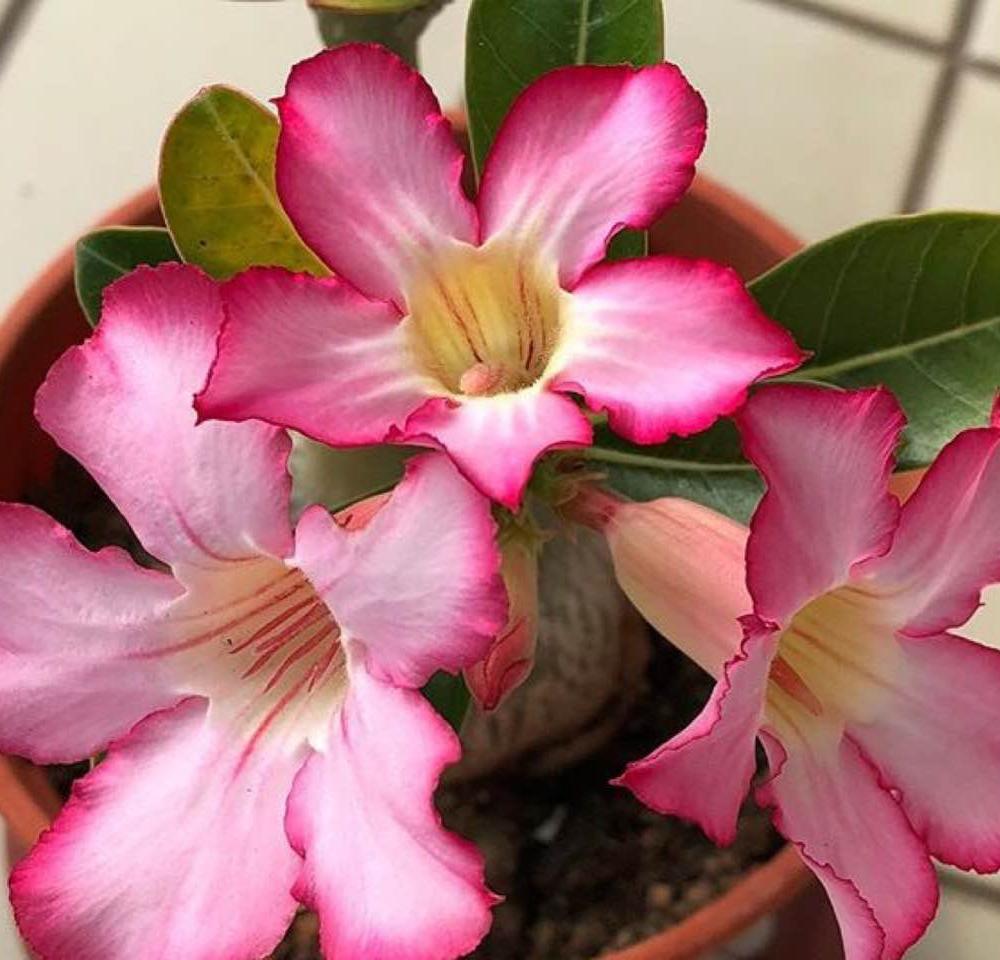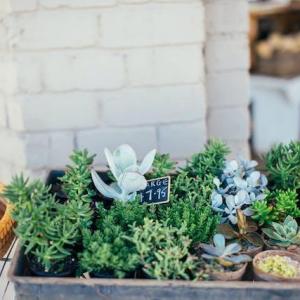Plant Experience
Detail
Adeniums are succulent, tropical plants. They are distinctive among the class because they develop a caudex, or swollen trunk. All succulent plants have some sort of water storage system, be it leaves, stems or roots. In desert rose, the trunk swells to conserve moisture for times of drought. A nice fat trunk is an indicator of plant health. A skinny stem can indicate that the plant requires more moisture.
An interesting bit of desert rose plant info is its natural resemblance to a bonsai plant, with a short stature when mature and tidy canopy perched atop the graduated stem. Many growers seem to have trouble caring for desert rose plants, but these can truly be easy to maintain if you keep in mind the water, temperature and lighting needs of Adenium.
Adenium Desert Rose Growing Tips
First, remember that Adenium plants are native to regions with poor, gritty soil and hot, sunny climates. You can’t expect the plant to thrive in overly moist soil, in a site with limited light. They are also not frost tolerant and will succumb to a freeze if exposed. The plant will not survive long if exposed to temperatures below 40 degrees F. (4 C.) but will thrive in temperatures reaching up to 90 degrees Fahrenheit (32 C.).
Desert rose succulents like bright light, so a southern window exposure provides enough sun for the plants to flourish and bloom. In the garden, choose a sunny location that has some protection from noonday sun, as this can scorch the foliage.
Soil is very important and should have a mixture of cactus soil with gritty sand or lava rocks for good drainage.
Desert Rose Plant Care
The one thing that will kill these plants quickly is improper watering. They are succulents but are used to rainy periods during which they grow, followed by a dormant, dry period. Match your watering practices to these needs for best success. Keep soil moderately moist in spring and summer, but reduce watering in fall and especially winter when the plant is dormant.
Fertilize with a dilution by half of a 20-20-20 liquid plant food once per month when the plant is actively growing. Do not feed the desert rose during winter.
The most common pests are scale, mealybugs and spider mites. Use cotton balls soaked in alcohol to wipe away these insect rogues.
Be cautious, as Adenium desert rose is in the Dogbane family, with all species bleeding a poisonous sap that can irritate skin and mucous membranes.
Propogation from stem cutting.
Take a cutting from the tip of a branch. Allow the cutting to dry out for a day or two, then wet the end of the desert rose cutting and dip it in rooting hormone. Stick the cutting into a well draining growing medium like perlite or sand mixed with soil.
An interesting bit of desert rose plant info is its natural resemblance to a bonsai plant, with a short stature when mature and tidy canopy perched atop the graduated stem. Many growers seem to have trouble caring for desert rose plants, but these can truly be easy to maintain if you keep in mind the water, temperature and lighting needs of Adenium.
Adenium Desert Rose Growing Tips
First, remember that Adenium plants are native to regions with poor, gritty soil and hot, sunny climates. You can’t expect the plant to thrive in overly moist soil, in a site with limited light. They are also not frost tolerant and will succumb to a freeze if exposed. The plant will not survive long if exposed to temperatures below 40 degrees F. (4 C.) but will thrive in temperatures reaching up to 90 degrees Fahrenheit (32 C.).
Desert rose succulents like bright light, so a southern window exposure provides enough sun for the plants to flourish and bloom. In the garden, choose a sunny location that has some protection from noonday sun, as this can scorch the foliage.
Soil is very important and should have a mixture of cactus soil with gritty sand or lava rocks for good drainage.
Desert Rose Plant Care
The one thing that will kill these plants quickly is improper watering. They are succulents but are used to rainy periods during which they grow, followed by a dormant, dry period. Match your watering practices to these needs for best success. Keep soil moderately moist in spring and summer, but reduce watering in fall and especially winter when the plant is dormant.
Fertilize with a dilution by half of a 20-20-20 liquid plant food once per month when the plant is actively growing. Do not feed the desert rose during winter.
The most common pests are scale, mealybugs and spider mites. Use cotton balls soaked in alcohol to wipe away these insect rogues.
Be cautious, as Adenium desert rose is in the Dogbane family, with all species bleeding a poisonous sap that can irritate skin and mucous membranes.
Propogation from stem cutting.
Take a cutting from the tip of a branch. Allow the cutting to dry out for a day or two, then wet the end of the desert rose cutting and dip it in rooting hormone. Stick the cutting into a well draining growing medium like perlite or sand mixed with soil.
Album (133)
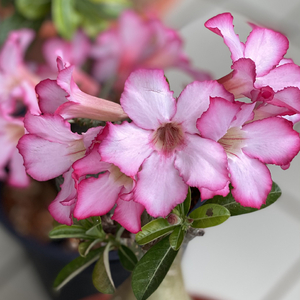
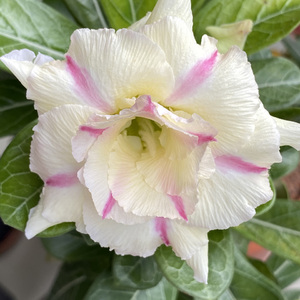
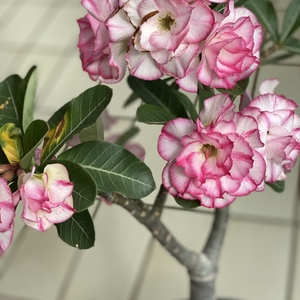
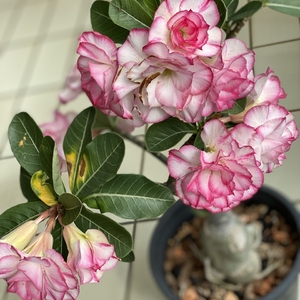
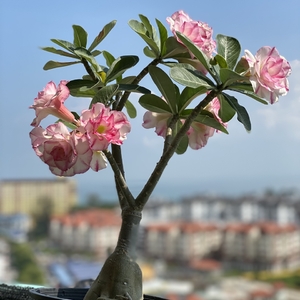

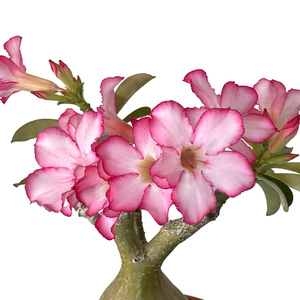
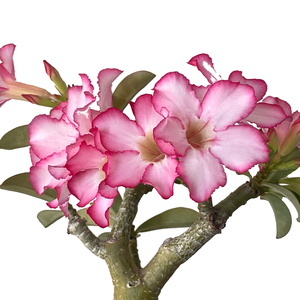
kensong
2020-11-21

Almost fully covered in flowers.


kensong
2020-11-21

Love this colour variation.


kensong
2020-11-13

All buds opened.






kensong
2020-11-13

Full of blooms and leaves all dropping.






kensong
2020-11-08

My common adenium flowers again.
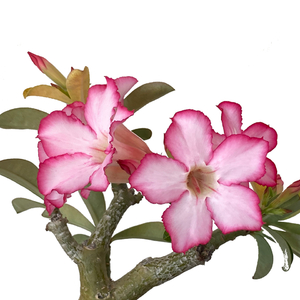
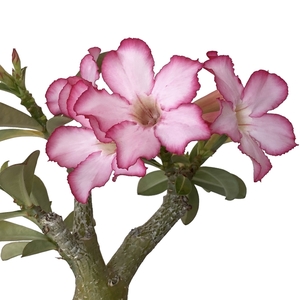
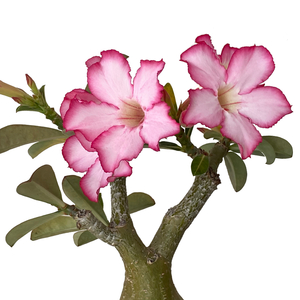



kensong
2020-11-08

More flowers opening.
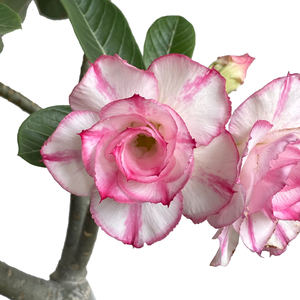
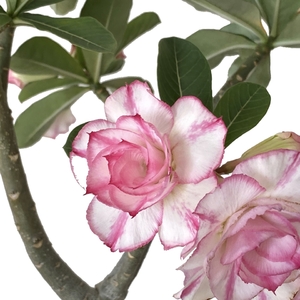
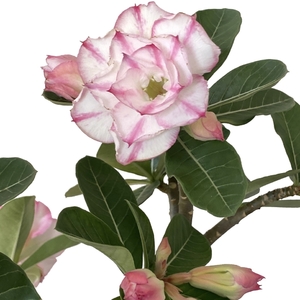



kensong
2020-11-07

New variant flowers for the first time.
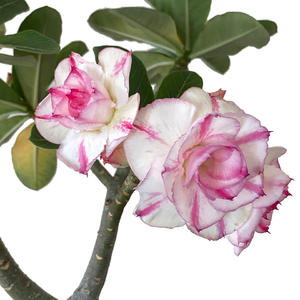
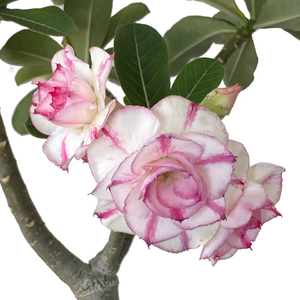


kensong
2020-11-07

More buds and flowers
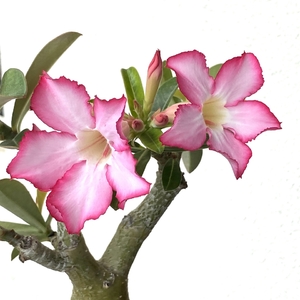

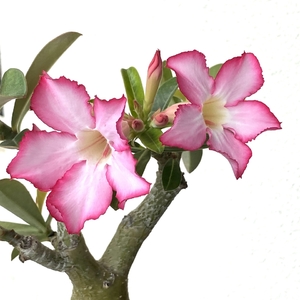



kensong
2020-11-01

Flowered again. Even with spidermites.
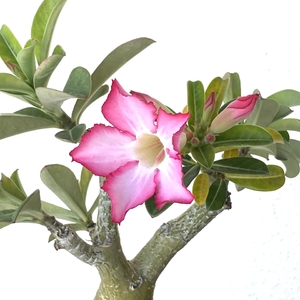

kensong
2020-10-25

New buds appearing.
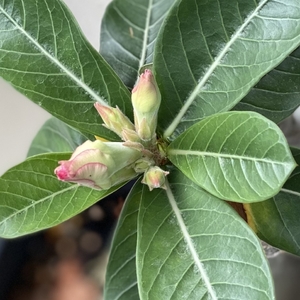
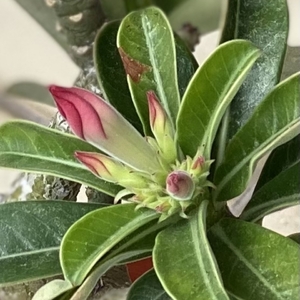


Elite Article


